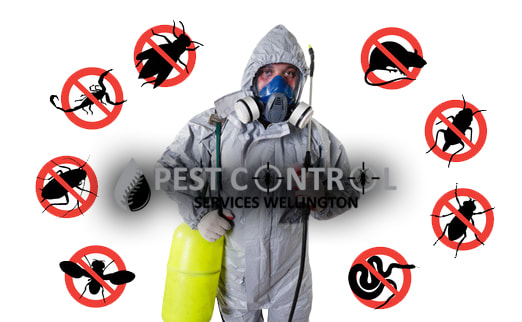Recognizing the Different Strategies to Insect Control: A Comprehensive Overview

Natural Insect Control Techniques
Using green methods such as friend planting and biological insect control is necessary for efficiently managing parasites in agricultural settings. Buddy planting entails growing various plants in proximity to hinder insects, enhance nutrient uptake, and enhance overall plant health and wellness.
Organic bug control involves presenting natural killers or pathogens to regulate pest populations. Ladybugs, for circumstances, feed upon aphids, regulating their numbers without the requirement for chemical pesticides. Another example is the usage of Bacillus thuringiensis (Bt), a germs that targets specific insect bugs while being safe to humans, animals, and beneficial bugs.
These eco-friendly techniques not just decrease the dependence on synthetic pesticides yet also assist preserve biodiversity and soil wellness. By integrating all-natural pest control methods right into agricultural methods, farmers can attain sustainable bug monitoring while reducing adverse effect on the setting.

Chemical Insect Control Solutions
Along with all-natural pest control methods, the usage of chemical bug control remedies plays a significant function in successfully taking care of pest populaces in farming environments. Chemical insect control services are developed to target certain parasites that may cause comprehensive damage to crops. These services commonly have artificial chemicals that are made to get rid of parasites promptly and successfully.
One of the crucial benefits of chemical bug control options is their performance in regulating insect invasions widespread. Farmers can use these remedies making use of numerous techniques such as splashing, airing out, or seed therapy to secure their plants from damaging bugs, weeds, and diseases. Additionally, chemical parasite control options are fairly simple to apply and can provide quick results, helping farmers safeguard their returns and lessen economic losses.
However, it is vital to make use of chemical insect control remedies carefully to minimize prospective adverse impacts on the setting, non-target organisms, and human health and wellness. Proper application techniques, adherence to security guidelines, and normal monitoring are vital to make certain the liable use of chemical parasite control solutions in farming practices.
Biological Parasite Control Approaches
Biological bug control comes close to take advantage of all-natural predators or microorganisms to take care of pest populations in farming setups efficiently. This technique offers a environment-friendly and lasting solution to pest administration, minimizing the dependence on synthetic chemicals and reducing damage to the setting. One common biological control method is the intro of all-natural adversaries, such as ladybugs or parasitical wasps, to target specific insects. These killers eat the parasites, helping to control their populations naturally - pest control clovis.
One more biological control approach includes utilizing microorganisms like fungi, microorganisms, or viruses to infect and eliminate bugs. In general, organic bug control approaches use a sustainable and targeted remedy to pest monitoring in farming.
Integrated Bug Monitoring (IPM)
Integrated Bug Monitoring (IPM) is an extensive method that integrates numerous insect control techniques to properly take care of and minimize pest populations in farming systems. IPM concentrates on long-lasting avoidance of pests via a mix of biological, cultural, physical, and chemical control techniques. By integrating these different methods, IPM aims to lower reliance on chemical pesticides, minimize ecological influence, and promote sustainable pest administration methods.
One trick aspect of IPM is using biological controls such as natural killers, parasites, and pathogens to regulate parasite populations. This technique uses the power of nature to maintain a balance between pests and their natural enemies without triggering damage to the atmosphere.
In addition, IPM entails social techniques like plant habitat, rotation, and sanitation manipulation to create unfavorable conditions for pests and disrupt their life cycles. Physical controls such as traps, barriers, and mulches are likewise used to stop insect invasions.
Physical and mechanical Insect Control Methods
Using non-chemical techniques, such as mechanical and physical insect control techniques, is a crucial aspect of thorough insect management techniques, developing upon the structure resource of Integrated Parasite Management's holistic strategy. Mechanical parasite control involves making use of physical barriers or check my site traps to avoid insects from accessing and harming crops or structures. This approach can include techniques like mounting displays on windows, using row covers in farming, or employing sticky catches to catch pests.
Physical insect control approaches, on the other hand, concentrate on directly eliminating parasites with physical methods. For example, utilizing heat therapies to eliminate bed pests or vacuuming up bugs like ants or crawlers can be effective means to manage problems without the use of chemicals. By integrating these mechanical and physical parasite control strategies right into an Integrated Pest Administration strategy, people and professionals can minimize reliance on chemicals while still efficiently reducing and managing pest populaces damages.
Conclusion

In enhancement to all-natural parasite control methods, the usage of chemical parasite control options plays a considerable function in successfully handling pest populaces in farming environments.One of the crucial benefits of chemical bug control options is their performance in controlling insect infestations on a big range.Integrated Parasite Monitoring (IPM) is a comprehensive technique that incorporates different bug control approaches to efficiently manage and decrease pest populations in agricultural systems.Making use of non-chemical techniques, such as physical and mechanical pest control methods, is a crucial aspect of extensive bug administration techniques, constructing upon the foundation of Integrated Parasite Monitoring's holistic method. By including these mechanical and physical insect control strategies basics into an Integrated Pest Monitoring plan, experts and people can decrease reliance on pesticides while still properly decreasing and managing pest populaces damages.